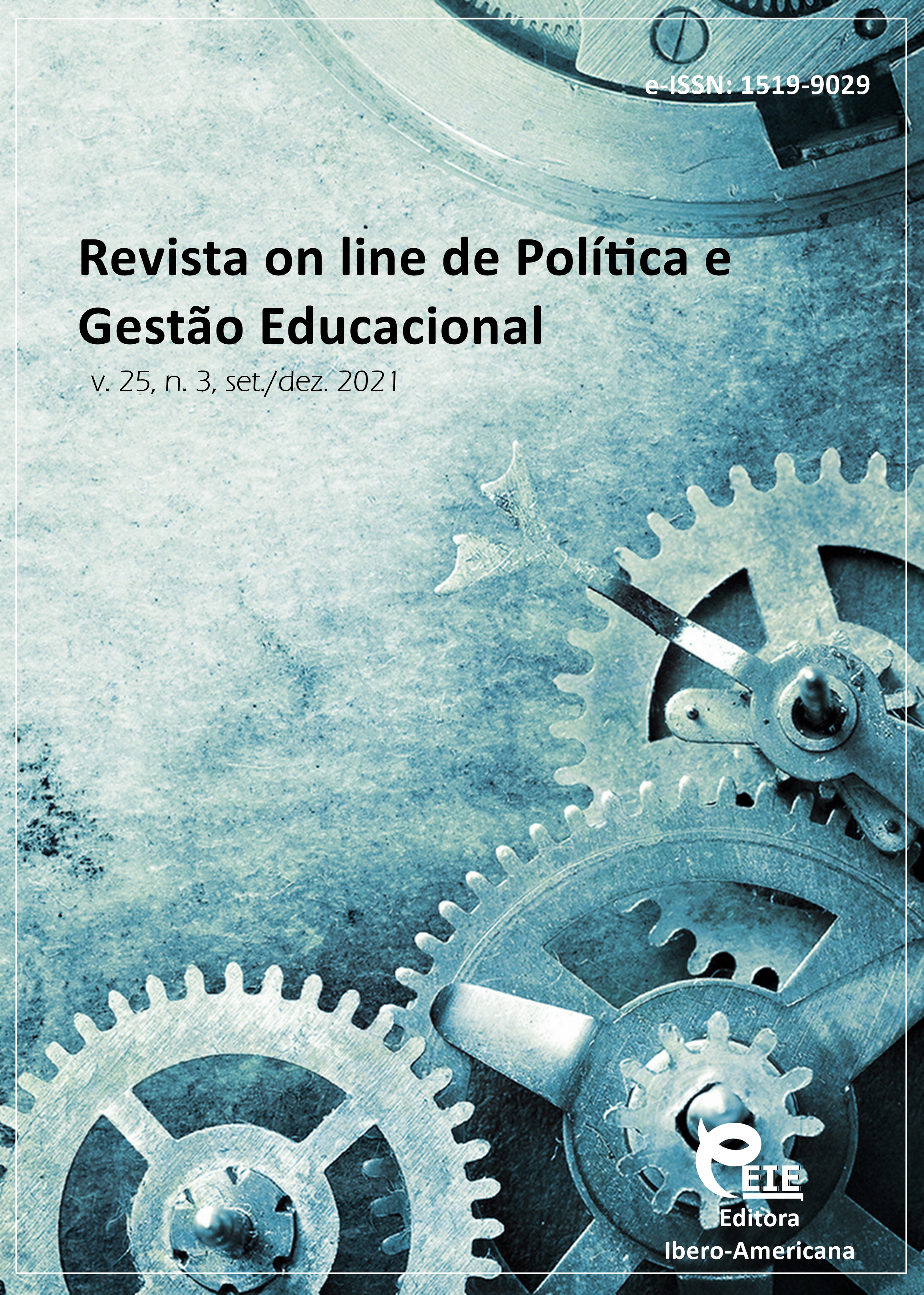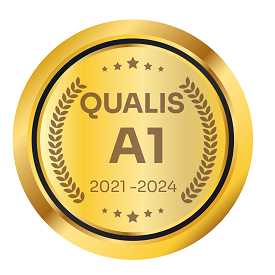La personalidad comunicativa del estudiante de sociología en el aprendizaje en el discurso pandémico
DOI:
https://doi.org/10.22633/rpge.v25i3.15925Palabras clave:
Competencia comunicativa, Educación a distancia, Educación digitalResumen
El artículo estudia la transformación de la personalidad comunicativa en términos de digitalización del espacio de aprendizaje y formación de los principales componentes de la competencia comunicativa de los estudiantes de sociología en la transición a la educación a distancia durante la pandemia de COVID-19. Se realiza el análisis de una personalidad comunicativa. Se utilizaron entrevistas en profundidad y entrevistas grupales como métodos de recopilación de datos. Los entrevistados son estudiantes de la Facultad de Sociología de MSU que asistieron a sus cursos de graduación en tiempo completo y a distancia. La guía de la entrevista está representada por preguntas correspondientes a parámetros individuales de la personalidad comunicativa. El método de análisis de datos empíricos es la codificación axial. Se reveló la especificidad de las características individuales de la personalidad comunicativa de los estudiantes, aprendiendo a distancia la profesión de sociólogo. El artículo destaca la motivación para ingresar al proceso comunicativo educativo, la ausencia de la influencia directa del aspecto cognitivo en el nuevo formato educativo y la transformación del componente ético de la personalidad comunicativa.
Descargas
Citas
ALVAREZ, M. C.; DOMENECH RODRIGUEZ, M. M. Cultural competence shifts in multicultural psychology: Online versus face-to-face. Translational Issues in Psychological Science, Pennsylvania, v. 6, n. 2, p. 160-174, 2020. DOI: https://doi.org/10.1037/tps0000229
ANDREEV, E. M. Personality. Sociological Encyclopedia. Moscow: Thought, 2003.
BORGE, M. et al. Building Multicultural Competence by Fostering Collaborative Skills. Teaching of Psychology, Denver, p. 1-8, 2020. DOI: https://doi.org/10.1177/0098628320977421
BORGE, M.; WHITE, B. Toward the development of sociometacognitive expertise: An approach to developing collaborative competence. Cognition and Instruction, Nashville, v. 34, n. 4, p. 323-360, 2016. DOI: https://doi.org/10.1080/07370008.2016.1215722
BUTARBUTAR, R. et al. Challenges and opportunities of accelerated digital literacy during the COVID-19 pandemic. Hong Kong Journal of Social Sciences, Hong Kong, n. 57, p. 160-168, 2021. Available: http://hkjoss.com/index.php/journal/article/view/424. Access: 8 Dec. 2021.
CHERNAVIN, Y. A. Cifrovoe obŝestvo: teoretičeskie kontury skladyvajuŝejsja paradigmy [Digital society: theoretical outlines of the emerging paradigm]. Cifrovaja Sociologija: Napravlenija Issledovanij [Digital Sociology: Research Directions], Moscow, v. 4, n. 2, p. 4-12, 2021. DOI: https://doi.org/10.26425/2658-347X-2021-4-2-4-12
CHUDNOVSKAYA, I. N. Kommunikativnaja kompetentnostʹ kak ličnostnyj resurs v cifrovom informacionnom prostranstve [Communicative competence as a personal resource in the digital information space]. In: CHUDNOVSKAYA, I. N. Kommunikativnyj kapital cifrovoj èpohi: Materialy naučnoj onlajn-konferencii s meždunarodnym učastiem [The communication capital of the digital age: Materials of the scientific online conference with international participation. Moscow: MAKS Press, 2021. DOI: https://doi.org/10.29003/m2015.978-5-317-06617-8
EPANCHINTSEVA, G.; BUKHTIYAROVA, I.; PANICH, N. Comparative Analysis of Perfectionism and Value-Semantic Barriers of the Student’s Personality. TEM JOURNAL - Technology, Education, Management, Informatics, Novi Pazar, v. 10, n. 1, p. 439-445, 2021. DOI: https://doi.org/10.18421/TEM101-55
FEHER, K. Digital identity and the online self: Footprint strategies – An exploratory and comparative research study. Journal of Information Science, Aberystwyth, v. 47, n. 2, p. 192-205, 2021. DOI: https://doi.org/10.1177/0165551519879702
FERRARI, F. Digital competence in practice: An analysis of frameworks. Luxembourg: Publications Office of the European Union, 2012. Available: https://ifap.ru/library/book522.pdf. Access: 13 Oct. 2021.
FÜRST, G.; GRIN, F. Multilingualism and creativity: A multivariate approach. Journal of Multilingual and Multicultural Development, London, v. 39, n. 4, p. 341-355, 2018. DOI: https://doi.org/10.1080/01434632.2017.1389948
FÜRST, G.; GRIN, F. Multicultural experience and multilingualism as predictors of creativity. International Journal of Bilingualism, Tilburg, v. 25, n. 5, p. 1486-1494, 2021. DOI: https://doi.org/10.1177%2F13670069211019468
GAVRA, D. P. Osnovy teorii kommunikacii [Foundations of the theory of communication]. Saint Petersburg: Peter, 2011.
KARASIK, V. I. Jazykovoj krug: ličnostʹ, koncepty, diskurs [Language circle: Personality, Concepts, Discourse]. Moscow: Gnozis, 2004.
KARAULOV, J. N. Russkij jazyk i jazykovaja ličnost’ [Russian language and linguistic personality]. 7. ed. Moscow: Editorial URSS, 2010.
KATERMINA, V. V.; SHESTAKOVA, A. A. Geroi online-setevyh praktik – cifrovaja ličnostʹ: tipologija i strategii povedenija [Heroes of online network practices – digital personality: typology and behavioral strategies]. In: Meždunarodnaja naučno-praktičeskaja konferencija «Jazykovaja ličnostʹ i èffektivnaja kommunikacija v sovremennom polikulʹturnom mire» [International Scientific and Practical Conference “The linguistic personality and effective communication in the modern multicultural world”, 4., 2018, Minsk. Proceedings [...]. Minsk: BSU, 2018. Available: https://elib.bsu.by/handle/123456789/210508. Access: 8 Dec. 2021.
KHACHIKYAN, E. I.; ZABORINA, M. A.; KONKINA, A. O. Rolʹ distancionnyh form obučenija v processe formirovanija kommunikativnoj kompetentnosti studenta vuza [The role of distance learning in the process of forming the communicative competence of a university student]. Problemy Sovremennogo Pedagogičeskogo Obrazovanija [Problems of Modern Teacher Education], Yalta, n. 71-3, p. 254-257, 2021.
KOLMYKOVA, T. S.; MISHCHENKO, A. V. Cifrovaja kompetentnostʹ kak ključevaja kategorija novogo kačestva čelovečeskogo kapitala [Digital competence as a key category of a new quality of human capital]. Vestnik Severo-Kavkazskogo Federalʹnogo Universiteta [Bulletin of the North Caucasus Federal University], Stavropol, v. 2, n. 83, p. 80-86, 2021. DOI: https://doi.org/10.37493/2307-907X.2021.2.10
KONETSKAYA, V. P. Sociologija kommunikacii [Sociology of communication]. Moscow: International University of Business and Management, 1997.
KORYAKINA, A. A. O polikulʹturnoj jazykovoj ličnosti [About multicultural linguistic personality]. Mir Nauki [World of Science], v. 4, n. 6, 2016. Available: http://mir-nauki.com/PDF/25PDMN616.pdf. Access: 11 Oct. 2021.
KUATBEKOV, A. et al. E-Learning as a basis for the development of media competences in students. Journal of Information Science, Aberystwyth, p. 1-15, 2021. DOI: https://doi.org/10.1177/01655515211040656
LEHTONEN, M. et al. Is bilingualism associated with enhanced executive functioning in adults? A meta-analytic review. Psychological Bulletin, Mansfield, v. 144, n. 4, p. 394-425, 2018. DOI: https://doi.org/10.1037/bul0000142
LIPATOVA, M. E. Kommunikativnaja kompetentnostʹ v cifrovom obrazovatelʹnom prostranstve vysšej školy [Communicative competence in the digital educational space of higher education]. In: Kommunikativnyj kapital cifrovoj èpohi [The communication capital of the digital age]. pp. 90-100. Moscow: LLC MAKS, 2021. DOI: https://doi.org/10.29003/m2015.978-5-317-06617-8
LOGUNOVA, L. Y. Metodologija izučenija žizni i ličnosti čeloveka: postanovka problemy [Methodology for studying human life and personality: problem statement]. Idei i idealy [Ideas and ideals], v. 1, n. 1(35), p. 142-163, 2018. DOI: http://doi.org/10.17212/2075-0862-2018-1.1-142-163
LUSHCHINSKAYA, O. V. Professionalʹnaja kommunikativnaja ličnostʹ v institucionalʹnyh diskursah: Tezisy dokladov meždunarodnogo kruglogo stola [Professional communicative personality in institutional discourses: scientific international round table abstracts]. Minsk: BSU, 2018. Available: https://elib.bsu.by/bitstream/123456789/193598/1/Профессиональная%20коммуникативная%20личность.pdf. Access: 8 Dec. 2021.
MARTIN, A.; GRUDZIECKI, J. DigEuLit: Concepts and Tools for Digital Literacy Development. Innovation in Teaching and Learning in Information and Computer Sciences, v. 5, n. 4, p. 249-267, 2006. DOI: https://doi.org/10.11120/ital.2006.05040249
MARTZOUKOU, K. et al. A study of university law students’ self-perceived digital competences. Journal of Librarianship and Information Science, Wellington, p. 1-19 2021. DOI: https://doi.org/10.1177%2F09610006211048004
MAZNICHENKO, S. A.; SAMOILOVA, M. V. Formy organizacii distancionnogo obučenija [Forms of organizing distance learning]. Pedagogičeskij Èksperiment: Podhody I Problemy [Pedagogical Experiment: Approaches and Problems], n. 7, p. 119-126, 2021.
MOROZOV, A. I. Akademičeskaja I Cifrovaja Kompetentnostʹ: Tendencii, Osobennosti I Strukturnaja Vzaimosvjazʹ [Academic and Digital Competence: Trends, Features and Structural Relationships]. Izvestija Volgogradskogo gosudarstvennogo pedagogičeskogo universiteta [Bulletin of the Volgograd State Pedagogical University], n. 1(154), p. 50-54, 2021.
NURGALIEVA, S. A. et al. Revisiting the term “polycultural linguistic personality”. Bulletin of the Karaganda University. Series Pedagogy, n. 3(91). p. 124-129, 2018.
PILILYAN, N. Y. Analiz ispolʹzovanija sovremennyh obrazovatelʹnyh tehnologij v obrazovatelʹnom učreždenii, rabotajuŝem v distancionnom režime [Analysis of the use of modern educational technologies in an educational institution working in a distance mode]. Voprosy Pedagogiki [Issues of Pedagogy], n. 6-2, p. 195-198, 2020.
POPOVA, D. A. Sposoby reprezentacii subʺektnosti cifrovoj ličnosti v žanre internet-kommentarija [Ways of representing the digital personality’s subjectivity in the genre of Internet commentary]. 2017. Dissertation (Doctorate in Philology) – Banzarov Buryat State University, Ulan-Ude, 2017.
PROFESSIONAL STANDARDS. Proekt professionalʹnogo standarta “Sociolog” napravlen v v Nacionalʹnom sovete pri Prezidente Rossijskoj Federacii po professionalʹnym kvalifikacijam [Professional standard “Sociologist: Specialist in fundamental and applied research]. 2021. Available: https://profstandart.rosmintrud.ru/nationalnews/107076/. Access: 13 Oct. 2021.
ROZIN, V. M. Cifrovizacija v obrazovanii (po sledam issledovanija “trudnosti i perspektivy cifrovoj transformacii obrazovanija”) [Digitalization in education (following the research “Difficulties and prospects of digital transformation of education”)]. Mir Psihologii [World of Psychology], n. 1-2, p. 104-115, 2021.
SOROCHINSKIY, M. A.; NIKULINA, S. V. Analiz i suŝnostʹ ponjatija «cifrovaja kompetentnostʹ pedagoga» [Analysis and essence of the concept of “the teacher’s digital competence”]. Perspektivy Nauki [Science Perspectives], Tambov, n. 6(129), p. 186-188, 2020.
STRAUSS, A. Fundamentals of qualitative research: Grounded theory, procedures, and techniques. Moscow: Editorial URSS, 2001.
TULCHINSKY, G. L. Cifrovaja transformacija obrazovanija: vyzovy vysšej škole [Digital transformation of education: challenges to higher education]. Filosofskie nauki [Philosophical Sciences], n. 6, p. 121-136, 2017.
VUORIKARI, R. et al. DigComp 2.0: The Digital Competence Framework for Citizens. Update Phase 1: The Conceptual Reference Model. Luxembourg: Publications Office of the European Union, 2016. Available: https://publications.jrc.ec.europa.eu/repository/handle/JRC101254. Access: 8 Dec. 2021.
YAKOBYUK, L. I. Izučenie vlijanija distancionnoj formy obučenija vo vremja pandemii na rezulʹtaty obučenija [Study the impact of distance learning during a pandemic on learning outcomes]. Mir nauki, kulʹtury, obrazovanija [World of science, culture, education], n. 5(84), p. 179-181, 2020. Available: https://cyberleninka.ru/article/n/izuchenie-vliyaniya-distantsionnoy-formy-obucheniya-vo-vremya-pandemii-na-rezultaty-obucheniya. Access: 13 Oct. 2021.
Publicado
Cómo citar
Número
Sección
Licencia
Derechos de autor 2021 Revista on line de Política e Gestão Educacional

Esta obra está bajo una licencia internacional Creative Commons Atribución-NoComercial-CompartirIgual 4.0.
Manuscritos aceitos e publicados são de propriedade da Revista on line de Política e Gestão Educacional. É vedada a submissão integral ou parcial do manuscrito a qualquer outro periódico. A responsabilidade do conteúdo dos artigos é exclusiva dos autores. É vedada a tradução para outro idioma sem a autorização escrita do Editor ouvida a Comissão Editorial Científica.











